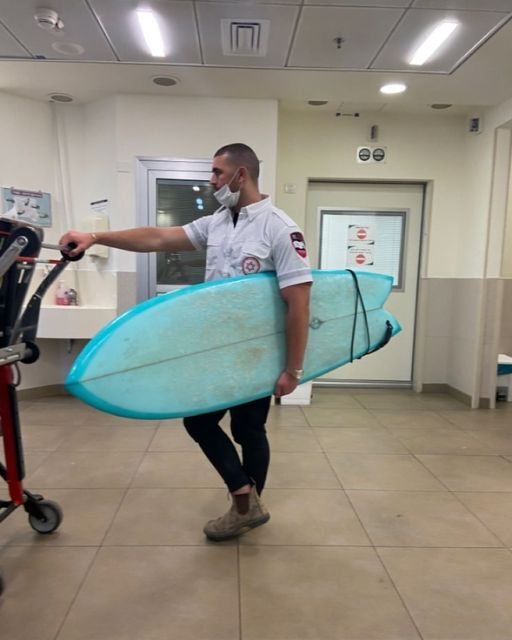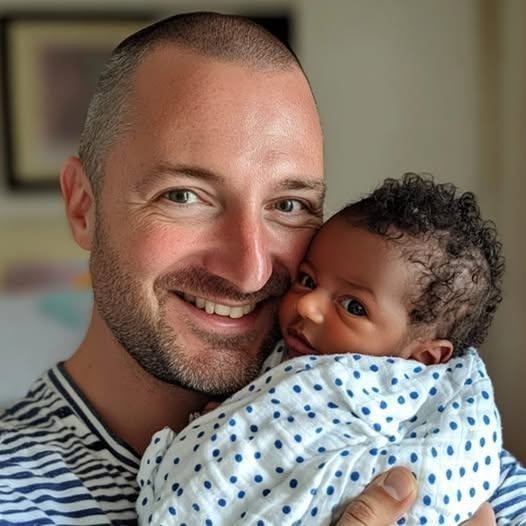It was the kind of night that made you hate being human. Cold enough that your fingers felt brittle, but not cold enough for snow, which somehow made it worse. The air was damp, heavy with the threat of rain, and the hospital smelled like bleach, sadness, and overworked fluorescent lights. I was four hours into my shift and already counting the seconds until morning.
I’m a nurse at Shoreline General, a mid-sized hospital on the Oregon coast, and if you’ve ever worked in an ER during flu season, you’ll understand the chaos. Kids crying with fevers, old men coughing so hard you worry about their lungs actually giving up, and every other person convinced they’re dying from something they read about on WebMD. We were down two nurses and our lead attending was on hour fifteen of a twelve-hour shift. In other words, things were a mess.
Then the guy walked in.
It wasn’t just that he was out of place—it was the way he carried himself, like he didn’t realize—or didn’t care—that he looked like he’d just washed ashore. His jeans were soaked up to the knees, his boots tracked sand across the linoleum, and his arm had a long scrape that was still bleeding slightly. But the most baffling part? He had a bright blue surfboard tucked under his arm like he’d taken a wrong turn on his way to the beach and decided to detour through the emergency room.
I was halfway through triaging a sprained wrist when I saw him. My patient turned to look too, eyebrows raised. The whole waiting room seemed to fall into a weird, breath-holding silence.
Then the yelling started.
A woman in the far corner stood up, cradling a little boy wrapped in a fleece blanket covered in cartoon dinosaurs. Her face was flushed with exhaustion and panic—the kind of look you only get after being in a hospital for too long, waiting too long, worrying too long. Her voice cut through the room like broken glass.
“What the hell is wrong with you?” she snapped, eyes fixed on the guy with the surfboard. “Is this a joke to you? People are in pain and you think this is some kind of game?”
He didn’t flinch. Just stood there, calm, like this wasn’t the first time someone had shouted at him. She kept going, her voice rising with every word.
“You’re distracting the nurses! You think this is a beach day? Why would you even bring that thing in here?”
I saw security start to shift at the far end of the room, ready to step in. I was about to signal for them, when the guy finally spoke.
“I’m sorry,” he said quietly. “It’s not mine.”
The room stilled. Even the woman seemed caught off guard by the softness in his voice.
“It belonged to the guy I pulled out of the ocean ten minutes ago.”
There was a beat of silence, like the whole room collectively forgot how to breathe.
“I was surfing off Breaker Point when I saw him go under. No lifeguard. No one else close enough. I got him out, started compressions until EMS showed up. He wasn’t breathing when I found him.”
He looked down at the board, brushing a thumb over a ding in the fiberglass. “This is all he had with him. I didn’t know where else to put it.”
No one said a word after that.
Even the little boy in the dinosaur blanket stopped squirming.
I stepped forward slowly. “Are you okay?” I asked him. “You’ve got a cut on your arm.”
He nodded, but didn’t move. “I’m fine. I just wanted to make sure he got here. They said this was where they were bringing him.”
I felt something shift in my chest. That quiet kind of ache that hits you when someone does something so selfless it makes you question if you’d have done the same.
I checked with intake, and sure enough, an ambulance had brought in a John Doe from Breaker Point just ten minutes before. He was alive, but barely.
I led the guy—his name was Carter, I later learned—back to a chair, and someone brought him a towel. I offered to take the surfboard to our lost-and-found, but he shook his head.
“I’ll hold onto it,” he said. “I think he’d want it close.”
Hours passed. I went back to triage, then to check vitals, then to help a doctor suture a teenager’s eyebrow after a skateboarding accident. But every time I passed Carter, he was still sitting there, the surfboard leaned against the wall next to him like a silent promise.
Around 3 a.m., the man from the water stabilized. They’d found a faint pulse and managed to intubate him just in time. He wasn’t conscious, but he was breathing on his own. One of the nurses from ICU came down to update Carter, and I watched his shoulders sag with relief like he’d been holding his breath for hours.
“Do you know who he is?” I asked.
He shook his head. “No idea. I just saw someone drowning and didn’t think twice.”
I stared at him. “Why bring the board?”
He smiled faintly. “Because when he wakes up, I want him to know someone didn’t just save his life and forget about him.”
A week later, the man did wake up.
His name was Thomas. Mid-thirties. Visiting from Colorado. Had never surfed before, but decided to try it on a whim while visiting a friend. Got pulled out by a riptide before anyone noticed he was missing. He remembered very little—just water, panic, then blackness.
When Carter walked into his room holding the surfboard, Thomas teared up.
“I thought I was dead,” he said. “I thought no one saw me.”
Carter just clapped a hand on his shoulder and said, “Some of us are always watching.”
That day, we all learned something. Not just about rip currents or CPR or surfboards. We learned about judgment. About how easy it is to assume the worst in people. And how sometimes, the loudest person in the room isn’t the one who makes the biggest impact—it’s the quiet one, soaked to the knees, carrying someone else’s burden without complaint.
The next shift, someone had written “SURFBOARD GUY” on the staff whiteboard and added a heart next to it.
And every time someone brought up that night, we all agreed on the same thing:
We almost yelled a hero out of the room.
Ever had a moment like that—where someone turned out to be so much more than you expected? Share this if you believe we all need to look a little closer before we judge.



